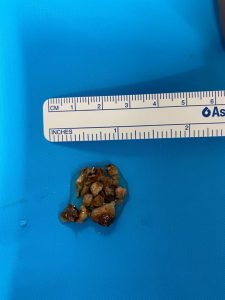Here at Melbourne Urology Centre, our doctors often get asked about how to prevent kidney stones. Kidney stones are a very common condition; up to one in ten people will develop kidney stones in their lifetime. They are a more common occurrence in men than in women.
Here at Melbourne Urology Centre, our doctors often get asked about how to prevent kidney stones. Kidney stones are a very common condition; up to one in ten people will develop kidney stones in their lifetime. They are a more common occurrence in men than in women.

Kidney stones are hardened mineral deposits that can form inside the kidney. Kidney stones may be present for some time before they are detected. In the kidney they are often asymptomatic. Over time they can begin to cause uncomfortable symptoms such as flank pain, fever or sweats if associated with infection. Patients may experience blood in the urine. If or once the stone falls into the ureter (tube going from kidney to bladder) this could be extremely painful and is called renal colic. Some stones that don’t cause obvious symptoms are detected incidentally on a CT or x-ray.
Knowing how to prevent kidney stones naturally by taking some simple steps can help you to reduce your risk of developing this common and potentially painful condition.
How to prevent kidney stones: Drink plenty of water.
Most often, when we are asked how to prevent kidney stones, our first answer is “drink more water!”. Staying well-hydrated throughout the day ensures that your urine output stays high. This is important because if you do not drink enough water, your urine output will be low, therefore your urine concentration will be high and less likely to be able to dissolve the urine salts that are responsible for causing kidney stones.
You should aim to drink enough water that ensures that your urine is clear or a very pale yellow colour. This may be 2 liters of fluid or more depending on your age, body size, the level of physical activity that you engage in, and the type of climate that you live in.
How to prevent kidney stones: Reduce your dietary salt intake.
Understanding how to prevent kidney stones by reducing your dietary salt intake is important. Most of us consume diets that are higher in salt than our body requires, even without adding extra. High-salt diets have been shown to increase the risk of calcium kidney stones. It is thought that this occurs because too much sodium in the urine prevents the reabsorption of calcium from the urine back into the blood. The high urine calcium level may then lead to the formation of kidney stones.
If you consume less salt, your urine calcium level will be lower. A lower urine calcium level means a lowered risk of developing calcium kidney stones. Read food product labels carefully (paying particular attention to the common high-salt culprits: processed foods, canned food and condiments) and avoid flavouring foods with added salt can help you to prevent kidney stones from developing.
How to prevent kidney stones: Try adding lemon juice to your water.
Lemon juice contains citrate (ie citric acid, which is naturally occurring in lemon juice), and citrate has been shown to block kidney stone formation. When considering how to prevent kidney stones, adding the juice of approximately two lemons into your daily water intake may help. At the very least, it won’t hurt and it will make your water more palatable!
How to prevent kidney stones: Reduce your intake of animal proteins.
Animal proteins such as red meats, poultry, eggs and seafood tend to boost the levels of uric acid, which may increase the chance of kidney stones forming. High protein diets have also been shown to reduce the level of urinary citrate. Reduce your risk by moderating your intake of animal proteins.
How to prevent kidney stones: Modify your diet.
Depending on the types of stones that you have had or are at risk of developing, your doctor may recommend some dietary modifications when considering how to prevent kidney stones. It is imperative that you discuss any dietary modifications thoroughly with your urologist prior to making changes.
If you’ve wondered about how to prevent kidney stones, the steps outlined above may reduce your risk.
Our urologist specialists often get a lot of questions around how to prevent kidney stones. By taking the simple steps discussed above, perhaps making some small modifications to your lifestyle, you may be able to effectively reduce your risk of developing this painful condition.
Please note that the information regarding how to prevent kidney stones, presented in the article above, is for educational purposes only and should not be taken as general medical advice. If you are experiencing any urinary symptoms or suspect that you may have kidney stones, please contact us promptly to make an appointment with one of our specialist urologists for a correct diagnosis and individual treatment plan.
